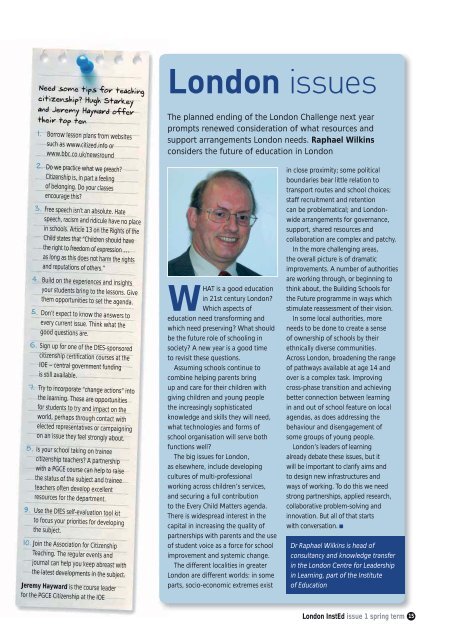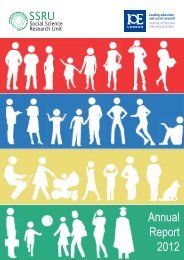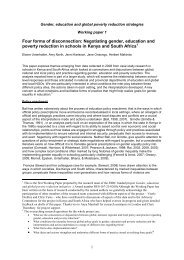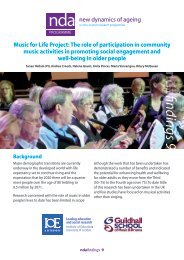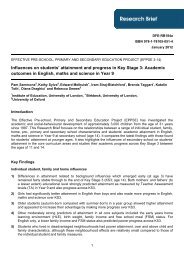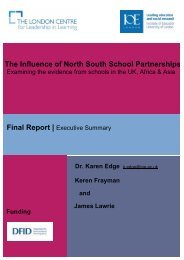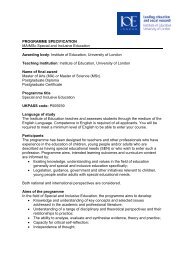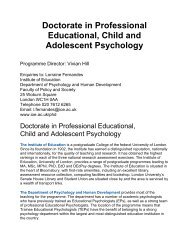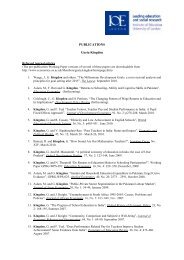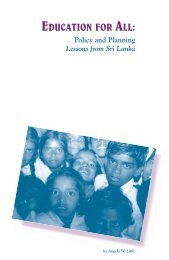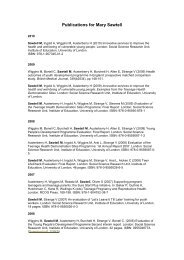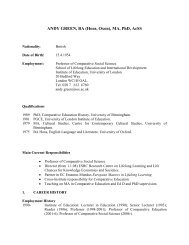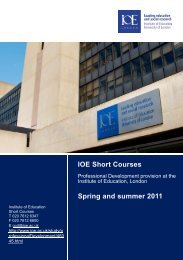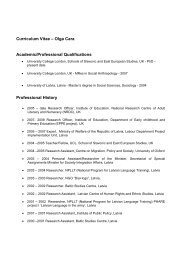Issue 1 - Institute of Education, University of London
Issue 1 - Institute of Education, University of London
Issue 1 - Institute of Education, University of London
You also want an ePaper? Increase the reach of your titles
YUMPU automatically turns print PDFs into web optimized ePapers that Google loves.
Need some tips for teaching<br />
citizenship? Hugh Starkey<br />
and Jeremy Hayward <strong>of</strong>fer<br />
their top ten<br />
1. Borrow lesson plans from websites<br />
such as www.citized.info or<br />
www.bbc.co.uk/newsround<br />
2. Do we practice what we preach?<br />
Citizenship is, in part a feeling<br />
<strong>of</strong> belonging. Do your classes<br />
encourage this?<br />
3. Free speech isn’t an absolute. Hate<br />
speech, racism and ridicule have no place<br />
in schools. Article 13 on the Rights <strong>of</strong> the<br />
Child states that “Children should have<br />
the right to freedom <strong>of</strong> expression …<br />
as long as this does not harm the rights<br />
and reputations <strong>of</strong> others.”<br />
4. Build on the experiences and insights<br />
your students bring to the lessons. Give<br />
them opportunities to set the agenda.<br />
5. Don’t expect to know the answers to<br />
every current issue. Think what the<br />
good questions are.<br />
6. Sign up for one <strong>of</strong> the DfES-sponsored<br />
citizenship certification courses at the<br />
IOE – central government funding<br />
is still available.<br />
7. Try to incorporate “change actions” into<br />
the learning. These are opportunities<br />
for students to try and impact on the<br />
world, perhaps through contact with<br />
elected representatives or campaigning<br />
on an issue they feel strongly about.<br />
8. Is your school taking on trainee<br />
citizenship teachers? A partnership<br />
with a PGCE course can help to raise<br />
the status <strong>of</strong> the subject and trainee<br />
teachers <strong>of</strong>ten develop excellent<br />
resources for the department.<br />
9. Use the DfES self-evaluation tool kit<br />
to focus your priorities for developing<br />
the subject.<br />
10. Join the Association for Citizenship<br />
Teaching. The regular events and<br />
journal can help you keep abreast with<br />
the latest developments in the subject.<br />
Jeremy Hayward is the course leader<br />
for the PGCE Citizenship at the IOE<br />
<strong>London</strong> issues<br />
The planned ending <strong>of</strong> the <strong>London</strong> Challenge next year<br />
prompts renewed consideration <strong>of</strong> what resources and<br />
support arrangements <strong>London</strong> needs. Raphael Wilkins<br />
considers the future <strong>of</strong> education in <strong>London</strong><br />
WHAT is a good education<br />
in 21st century <strong>London</strong>?<br />
Which aspects <strong>of</strong><br />
education need transforming and<br />
which need preserving? What should<br />
be the future role <strong>of</strong> schooling in<br />
society? A new year is a good time<br />
to revisit these questions.<br />
Assuming schools continue to<br />
combine helping parents bring<br />
up and care for their children with<br />
giving children and young people<br />
the increasingly sophisticated<br />
knowledge and skills they will need,<br />
what technologies and forms <strong>of</strong><br />
school organisation will serve both<br />
functions well?<br />
The big issues for <strong>London</strong>,<br />
as elsewhere, include developing<br />
cultures <strong>of</strong> multi-pr<strong>of</strong>essional<br />
working across children’s services,<br />
and securing a full contribution<br />
to the Every Child Matters agenda.<br />
There is widespread interest in the<br />
capital in increasing the quality <strong>of</strong><br />
partnerships with parents and the use<br />
<strong>of</strong> student voice as a force for school<br />
improvement and systemic change.<br />
The different localities in greater<br />
<strong>London</strong> are different worlds: in some<br />
parts, socio-economic extremes exist<br />
in close proximity; some political<br />
boundaries bear little relation to<br />
transport routes and school choices;<br />
staff recruitment and retention<br />
can be problematical; and <strong>London</strong>wide<br />
arrangements for governance,<br />
support, shared resources and<br />
collaboration are complex and patchy.<br />
In the more challenging areas,<br />
the overall picture is <strong>of</strong> dramatic<br />
improvements. A number <strong>of</strong> authorities<br />
are working through, or beginning to<br />
think about, the Building Schools for<br />
the Future programme in ways which<br />
stimulate reassessment <strong>of</strong> their vision.<br />
In some local authorities, more<br />
needs to be done to create a sense<br />
<strong>of</strong> ownership <strong>of</strong> schools by their<br />
ethnically diverse communities.<br />
Across <strong>London</strong>, broadening the range<br />
<strong>of</strong> pathways available at age 14 and<br />
over is a complex task. Improving<br />
cross-phase transition and achieving<br />
better connection between learning<br />
in and out <strong>of</strong> school feature on local<br />
agendas, as does addressing the<br />
behaviour and disengagement <strong>of</strong><br />
some groups <strong>of</strong> young people.<br />
<strong>London</strong>’s leaders <strong>of</strong> learning<br />
already debate these issues, but it<br />
will be important to clarify aims and<br />
to design new infrastructures and<br />
ways <strong>of</strong> working. To do this we need<br />
strong partnerships, applied research,<br />
collaborative problem-solving and<br />
innovation. But all <strong>of</strong> that starts<br />
with conversation.<br />
Dr Raphael Wilkins is head <strong>of</strong><br />
consultancy and knowledge transfer<br />
in the <strong>London</strong> Centre for Leadership<br />
in Learning, part <strong>of</strong> the <strong>Institute</strong><br />
<strong>of</strong> <strong>Education</strong><br />
<strong>London</strong> InstEd issue 1 spring term 15


